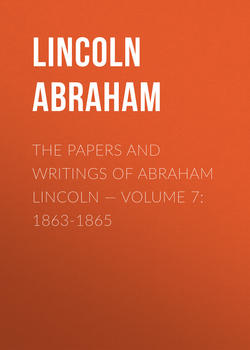Читать книгу The Papers And Writings Of Abraham Lincoln — Volume 7: 1863-1865 - Lincoln Abraham - Страница 78
THE STORY OF THE EMANCIPATION PROCLAMATION
ОглавлениеTOLD BY THE PRESIDENT, TO THE ARTIST F. B. CARPENTER,
FEBRUARY 6, 1864.
"It had got to be," said Mr. Lincoln, "midsummer, 1862. Things had gone on from bad to worse, until I felt that we had reached the end of our rope on the plan of operations we had been pursuing; that we had about played our last card, and must change our tactics, or lose the game. I now determined upon the adoption of the emancipation policy; and without consultation with, or the knowledge of, the Cabinet, I prepared the original draft of the proclamation, and, after much anxious thought, called a Cabinet meeting upon the subject. This was the last of July or the first part of the month of August, 1862. [The exact date was July 22, 1862.]... All were present excepting Mr. Blair, the Postmaster-General, who was absent at the opening of the discussion, but came in subsequently. I said to the Cabinet that I had resolved upon this step, and had not called them together to ask their advice, but to lay the subject-matter of a proclamation before them, suggestions as to which would be in order after they had heard it read. Mr. Lovejoy was in error when he informed you that it excited no comment excepting on the part of Secretary Seward. Various suggestions were offered. Secretary Chase wished the language stronger in reference to the arming of the blacks.
"Mr. Blair, after he came in, deprecated the policy on the ground that it would cost the administration the fall elections. Nothing, however, was offered that I had not already fully anticipated and settled in my mind, until Secretary Seward spoke. He said in substance, 'Mr. President, I approve of the proclamation, but I question the expediency of its issue at this juncture. The depression of the public mind, consequent upon our repeated reverses, is so great that I fear the effect of so important a step. It may be viewed as the last measure of an exhausted government, a cry for help; the government stretching forth its hands to Ethiopia, instead of Ethiopia stretching forth her hands to the government.' His idea," said the President, "was that it would be considered our last shriek on the retreat." [This was his precise expression.] 'Now,' continued Mr. Seward, 'while I approve the measure, I suggest, sir, that you postpone its issue until you can give it to the country supported by military success, instead of issuing it, as would be the case now, upon the greatest disasters of the war.' Mr. Lincoln continued "The wisdom of the view of the Secretary of State struck me with very great force. It was an aspect of the case that, in all my thought upon the subject, I had entirely overlooked. The result was that I put the draft of the proclamation aside, as you do your sketch for a picture, waiting for a victory.
"From time to time I added or changed a line, touching it up here and there, anxiously watching the process of events. Well, the next news we had was of Pope's disaster at Bull Run. Things looked darker than ever. Finally came the week of the battle of Antietam. I determined to wait no longer. The news came, I think, on Wednesday, that the advantage was on our side. I was then staying at the Soldiers' Home [three miles out of Washington]. Here I finished writing the second draft of the preliminary proclamation; came up on Saturday; called the Cabinet together to hear it, and it was published on the following Monday."
